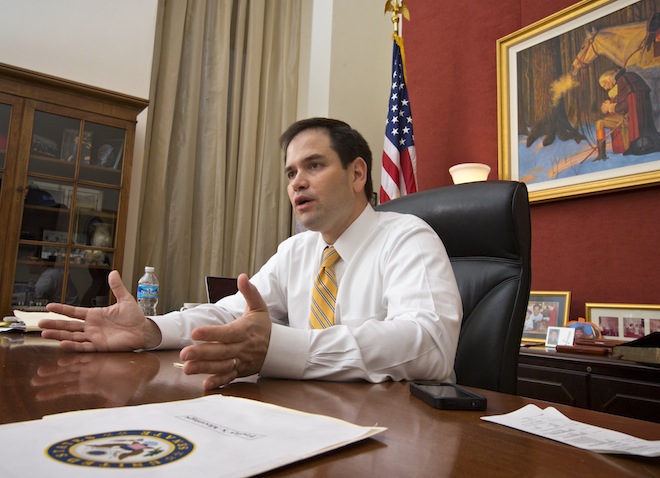You’d expect Sen. Marco Rubio to be elated by the news over the weekend that labor and business groups reached a deal on a guest worker program, given that he’d identified their slow progress as one of the biggest obstacles to reform. Instead, Rubio used the occasion to issue warnings about “premature” celebration and demand that the Senate slow the whole process down.
Rubio’s surprising move comes as a leading anti-immigration Republican, Sen. Jeff Sessions (AL), is demanding a lengthier process as well. The timing has prompted concern among pro-reform activists that Rubio might already be looking for an emergency exit in case the debate stokes a backdraft on the right. In this instance, one that’s completely removed from any actual policy differences over a bill.
“I think he’s trying to signal to the right that he’s going to protect their interests in a transparent process,” Frank Sharry, executive director of America’s Voice, told TPM. “But it’s a dangerous game, because if he coddles people who are determined to use delays to derail immigration reform, then he could end up handing reform opponents a huge club to beat him and others with.”
It’s not hard to see why Sharry is concerned: there’s a rich history of Republicans crossing party lines on major legislation only to flee over vague procedural complaints when the going gets tough. In 2009, former Sen. Olympia Snowe (R-ME) voted for health care reform in committee, citing an urgent need for change, then opposed it two months later while claiming the vote was too rushed. In 2010, Sen. Lindsey Graham (R-SC) dropped out of bipartisan talks on energy and immigration because the White House wanted to tackle the two issues in the wrong order. At least Graham lasted longer than Sen. John McCain (R-AZ), who personally introduced climate change and immigration bills in 2007 then abandoned both causes as soon as President Obama took office.
It would be ironic if McCain and Graham finally returned to the negotiating table on immigration only to find Rubio follow their own playbook and leave. But while Rubio’s recent behavior does give him more room to drop out, it’s highly unlikely he will actually do so. Instead, this latest Rubio flareup looks an awful lot like the last big Rubio flareup on immigration — a wink to conservatives without any actual substantive concerns behind it.
In January, Rubio made a big show of attacking the White House for working on their own immigration bill and opposing a border trigger, even though the White House plan was extremely similar to his own framework and was chock full of border security measures. The strategy then was clear enough: Rubio used his tough talk to reassure conservative commentators that they could embrace his bipartisan plan without handing Obama a political victory.
The latest complaint fits the same pattern, with Rubio once again setting himself up to claim credit for winning concessions that no one opposed in the first place.
This week Rubio is telling the right that he’ll stop those sneaky Democrats from ramming a bill down their throats like they did with health care. But Majority Leader Harry Reid (D-NV) has already said immigration legislation will go through the usual committee and amendment process. So has Sen. Patrick Leahy (D-VT), the chair of the Judiciary Committee that will examine the bill. It’s not clear what’s left for Rubio to do.
“This bill is going to move through regular order with plenty of time and opportunity for both sides to weigh in,” a Democratic leadership aide told TPM.
Meanwhile, Rubio still has very little to gain from leaving the process. He’s already signed on to the most controversial aspects of immigration reform on the right, including a path to citizenship for undocumented immigrants, so he’d be plenty vulnerable on the issue in a Republican primary. The world in which an enraged GOP base forces Rubio to bolt talks is a world where Rubio’s 2016 hopes are already dead — both in the primary, where his opponents could attack him from the right, and in the general election, where he’d have nothing to show Latino voters already skeptical of his party.
The good news for Rubio is that the GOP base isn’t in a mass revolt. Far from it, actually. One recent poll by the Brookings Institute found majority support for immigration reform that included a path to citizenship among not only Republicans, but white evangelicals and white working class voters. Even a plurality of tea partiers liked the idea, which might explain why politicians like Sen. Rand Paul (R-KY) are hugging reform closer lately.






